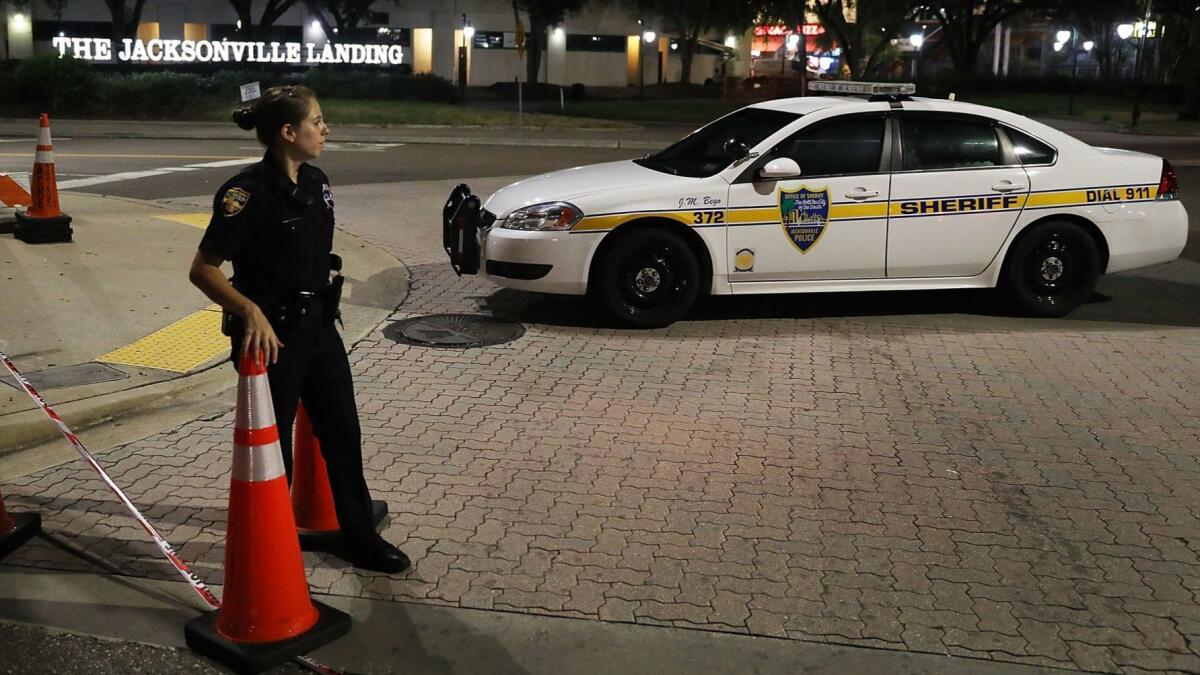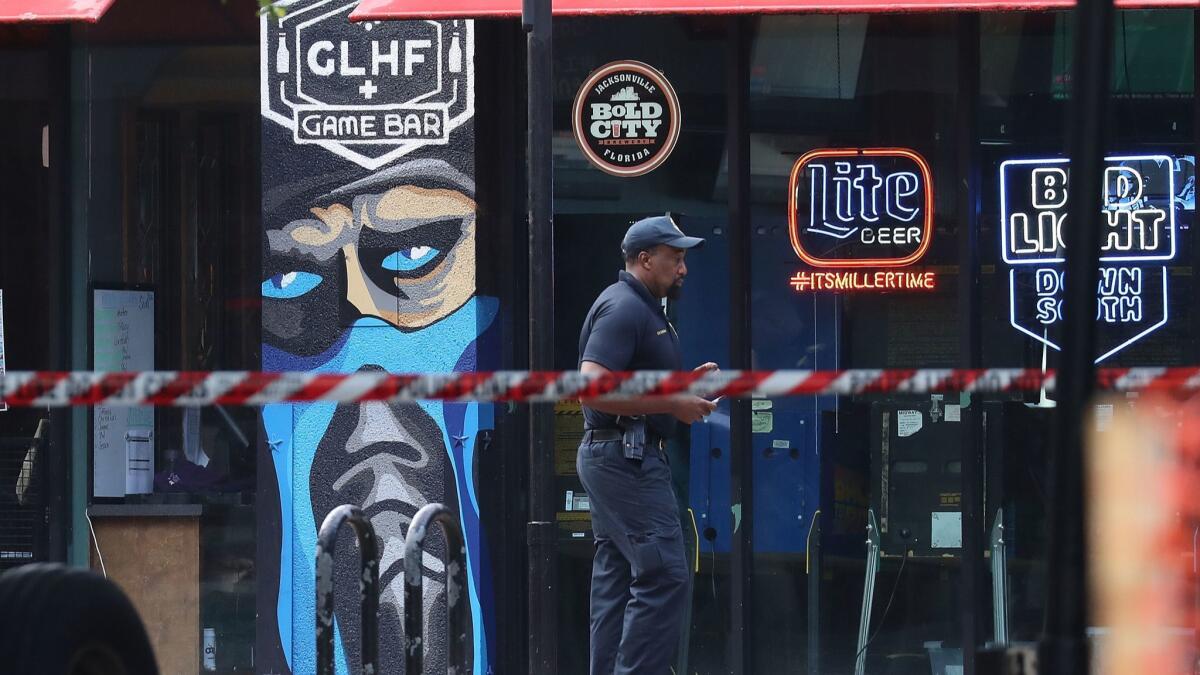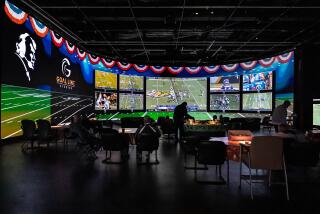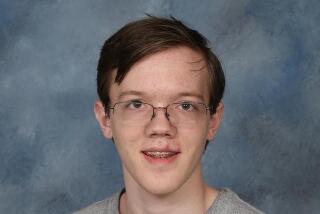Shooting in Jacksonville unnerves the close-knit ‘Madden’ community

- Share via
Reporting from Jacksonville, Fla. — “Madden NFL” is a popular video game series, but its hardcore devotees are more than just gamers. It was the close-knit online community of “Madden” players that helped Sacramento gamer Rick Juarez deal with the depression that set in after his mother’s death several years ago.
“Whether it was meeting up online or going to each other’s homes, they were there for me during tough times,” said Juarez, 38.
Two years ago, longtime gamer Allen Louis Johnson, 36, had a similarly bad streak of luck. First he got fired from his job; then depression hit. Johnson, who had stopped playing Madden a few years ago, nonetheless turned to his online Madden community to vent. They came up with an idea: They’d buy Johnson an Xbox One gaming console.
“It was a surprise,” said Johnson, who lives in Los Angeles. “I didn’t ask for it or nothing, and they came together and got me the Xbox, and it felt so good.”
That community was thrown into disarray Sunday when one of its members opened fire on fellow competitors after losing a “Madden NFL 19” tournament in a Jacksonville, Fla., pizza restaurant.
When the shooting was over, two members of the “Madden” community, Elijah Clayton and Taylor Robertson, were dead. Ten other people, many of them gamers, were wounded.
The shooter — David Katz, 24, of Baltimore, who sometimes played under the name Bread — shot and killed himself.
Investigators on Monday were still trying to determine whether Katz had planned the attack or if it was a crime of passion sparked by his own losses at the regional tournament, where players were vying for spots in a more prestigious tournament in Las Vegas.
“We don’t have anything where we can stand up here today and say ‘This is the motive,’” Jacksonville Sheriff Mike Williams said at a news conference. He said Katz had legally bought two handguns within the last month in Baltimore, where he lived, but that investigators had “no indication this is something he planned prior to Sunday.”
Katz apparently ignored other pizzeria patrons to specifically target gamers, the sheriff said.
Both players who beat Katz in the tournament were still alive, leading one of them to conclude that they were not targets.
“He seemed to target popular names in the ‘Madden’ community,” Dennis “Evil Ken” Alston, 27, of East Orange, N.J., said in a Twitter message Monday.
For many Americans, video games have long been an escape, a place to unburden themselves from the indignities of daily life and transform onscreen into something more — a gifted athlete with incredible speed and strength, or a courageous GI fighting Nazis in World War II, or a superhero of seemingly limitless power.
In recent years, high-speed internet connectivity has helped expand multiplayer gaming from the dorm room into a global network of friends and adversaries who train several hours a day and broadcast their matches to fans on livestreaming services, sometimes for advertising revenue.
Competitive gaming can be a place to make money, but it’s also a community — sometimes a place to talk trash, sometimes a network of mutual support.
“Any city I go, I have friends and stay at people’s houses,” Johnson said. “Everyone is welcoming in the community.”
At the same time, Johnson understands the loneliness and isolation of some gamers who compete in tournaments and lose. “I’ve traveled to a city alone and then lost, and once you lose, no one cares unless you’re there with family,” Johnson said.
Katz was known as one of the regular competitors on the professional “Madden” circuit, but he was not one of the high-profile personalities. Some of his victims were.
Robertson was the fourth-place earner among professional “Madden” players last year, netting $70,000, and Clayton was the 10th-place earner, winning $30,000, according to E-Sports Earnings, a website that tracks professional gamers.
At age 27, Robertson, of Giles, W.Va., was seen as one of the more mature players.
“In a community filled with people showboating and talking about themselves all the time, he was a guy that was very humble,” said Chris “Dubby” McFarland, 31. “He always had a smile on his face. He was a guy that had a job and a family and still tried to compete with the 18- and 19-year-olds that are out there playing all day.”
Clayton, a 22-year-old who grew up in West Hills in Southern California, excelled at football both in high school and onscreen.
Nick “Jag” Heichert spent last weekend with Clayton in San Diego for a fantasy baseball competition.
Heichert met Clayton a few years ago at a “Madden” tournament in Las Vegas and watched him rise to become one of the top players in the country as well as “one of the most respected,” he said.
Katz, who also sometimes played under the handle Ravenschamp, a nod to the Baltimore Ravens, wasn’t known to have close friends in the community.
“He was just kind of that outcast in the group, you know?” said Alexander Madunic, 27, from Milwaukee, a competitor whom Katz shot in the lower leg. “Very quiet, never ever showing emotion. He was like the kid at high school that you wouldn’t mess around with.”
Court documents filed in 2005 in Katz’s parents’ divorce said he had emotional and social struggles, including a hospitalization for psychiatric treatment and problems in school.
“He briefly spoke of a tough family life and seemed sad in general,” said Juarez, recalling a time he talked to Katz. “I wish he could’ve been around the community more to see that he would’ve made friends.”
In 2017, Rob Schuster, 30, played at the Bills Madden Championship, which Katz won. “He didn’t seem as happy as someone who would act that won,” Schuster said. “He seemed a little off.”
In the Jacksonville competition, Alston said he tried to shake Katz’s hand after beating him Saturday. But Katz just stared at him blankly.
Alston said Katz was wearing the same clothes Sunday as he had the day before and that, even walking around indoors, he did not remove his sunglasses.
“Big giant silver glasses, and he was just clearly looking around,” said Nicholas Withrow, 28, who flew to the tournament from Detroit.
Gamers said the event was crowded and had almost no security.
McFarland was in the middle of a “Madden NFL 19” game, eyes locked on his screen, when Katz entered the room and opened fire.
At first he thought the sound of the gunshots was some kind of technological malfunction at the packed video game tournament — maybe a speaker blowing out, or something. Then a bullet grazed the left side of his head.
Blood ran down his face as McFarland dropped to the floor, curled into a ball and watched players and restaurant patrons run for cover.
More than 20 people huddled in a bathroom. “People were guarding the bathroom door with their bodies and planned to take the gunman down if he came inside,” Withrow said.
Alston helped block the door. “We had no weapons or anything to protect us; felt completely hopeless,” Alston wrote in a private Twitter message.
The shooter never tried to enter.
Alston said he wasn’t sure what future “Madden” tournaments would be like after Sunday’s shooting.
“We laugh, we joke, we talk trash, but at the end of the day, we were all like brothers stationed everywhere, all willing to open our home doors to each other if another was in town,” Alston said. “We all will remain a brotherhood, even without ‘Madden.’”

Jarvie reported from Jacksonville, Etehad from Los Angeles, Hennessy-Fiske from Houston and Pearce from Los Angeles. The Baltimore Sun contributed to this report.
More to Read
Sign up for Essential California
The most important California stories and recommendations in your inbox every morning.
You may occasionally receive promotional content from the Los Angeles Times.

















